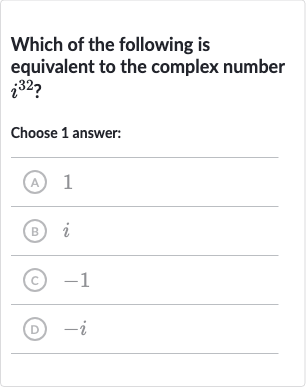Full solution
Q. Which of the following is equivalent to the complex number ?Choose answer:(A) (B) (C) (D)
- Definition of i: To solve for , we need to remember that is the imaginary unit, which is defined by . We can use the powers of to simplify .
- Powers of i: The powers of i repeat in a cycle: , , , and . This cycle repeats every powers. Since is a multiple of (), will be the same as .
- Simplifying : Using the cycle, we know that . Therefore, .
- Using the cycle: raised to any power is still , so .
- Simplifying : Therefore, is equivalent to .
More problems from Domain and range of quadratic functions: equations
QuestionGet tutor help

